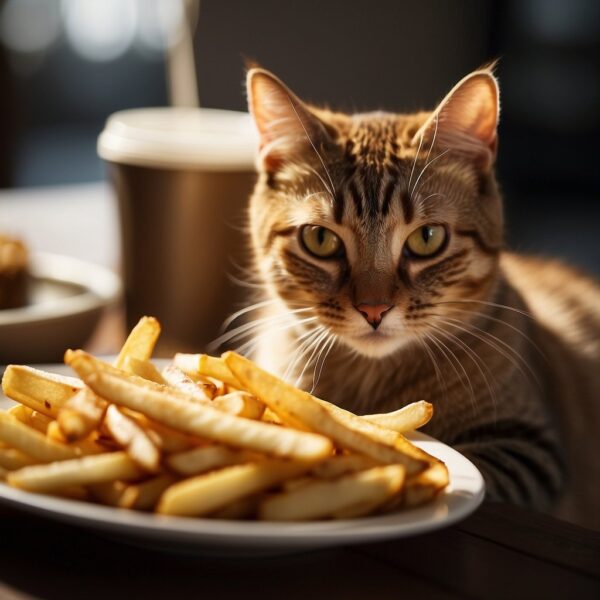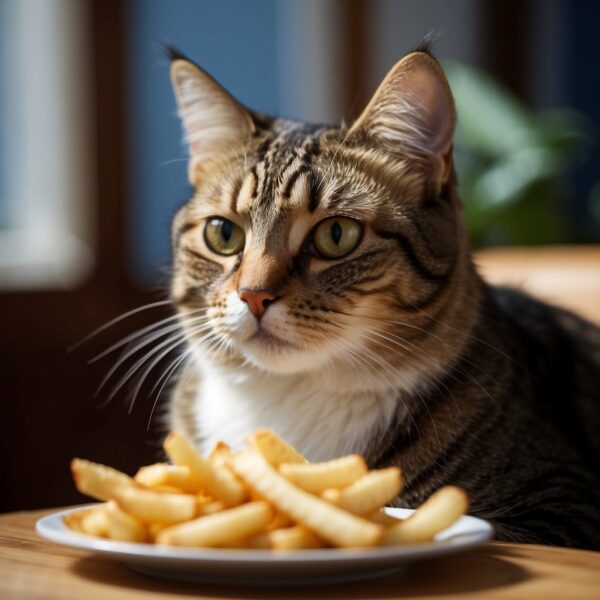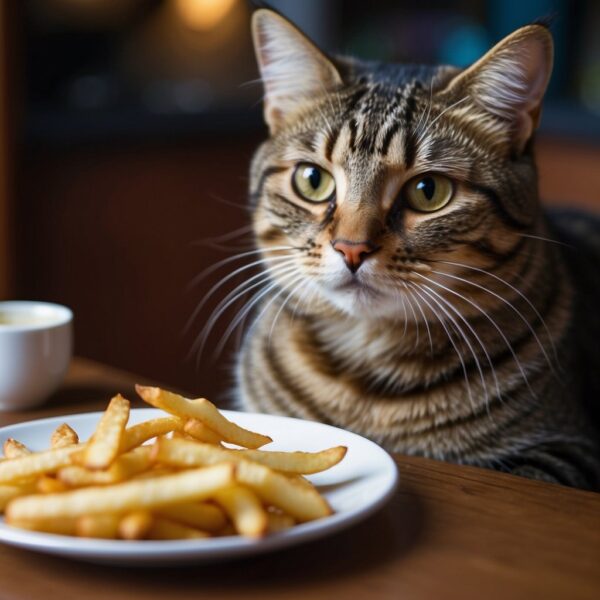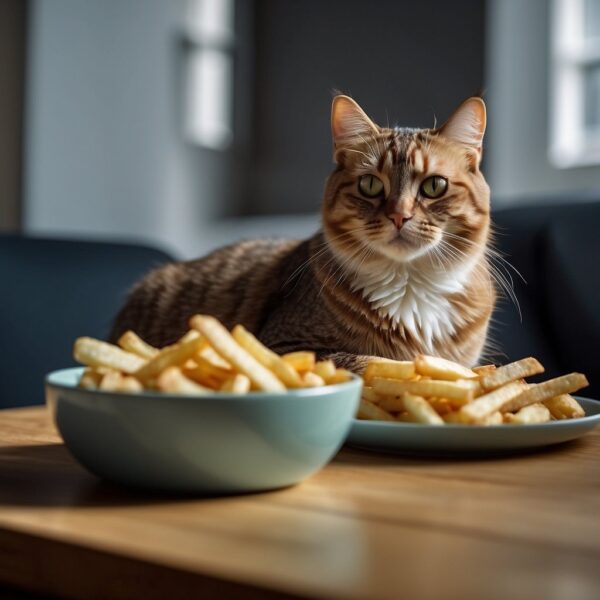
Cats and French Fries? Understanding the Risk
Many cat parents may ponder whether sharing a bit of human food with their cats is safe. Can cats eat French fries for example. While these salty treats are not toxic to cats, they are not suitable for a cat’s dietary needs and can pose health risks. Cats lack the necessary enzymes to properly digest the various ingredients in French fries, including fats and seasonings, which are commonplace in human foods but foreign to a cat’s natural carnivorous diet. Overconsumption of such items can lead to obesity, diabetes, and other health issues in cats.
Curiosity often drives cats to explore foods they see humans eating, which sometimes includes reaching for a French fry. While a tiny nibble might not lead to immediate harm, regularly indulging a cat’s curiosity with human food can foster poor eating habits and contribute to potential health problems. Moreover, cats may develop a taste for unhealthy snacks, rejecting their own nutritionally balanced diet in favor of less suitable options. Cat parents are encouraged to provide their cats with appropriate treats designed for feline consumption to ensure their well-being and nutritional health.
Key Takeaways
- French fries are not toxic to cats but are unsuitable and unhealthy for their diet.
- Consistently feeding cats human foods like French fries can lead to health issues and dietary indiscretion.
- Offering cats specially formulated feline treats satisfies their curiosity while maintaining a healthy diet.
Health Risks of Cats Eating French Fries
French fries pose significant health risks to cats, including toxic ingredients, high salt and fat content, and potential for obesity and diabetes. These risks can lead to serious gastrointestinal issues.
Toxic Ingredients in French Fries
French fries occasionally contain onion and garlic, ingredients that are toxic to cats. The ingestion of these can lead to a condition called hemolytic anemia, which is the destruction of red blood cells leading to lethargy and weakness.
High Salt and Fat Content
The high salt content in french fries can lead to sodium ion toxicity. Symptoms include vomiting, diarrhea, excessive thirst, urination, high blood pressure, and in severe cases, seizures. French fries are also high in fat, which can strain a cat’s digestive system, leading to pancreatitis or an upset stomach.
Potential for Obesity and Diabetes
Overfeeding cats with high-carbohydrate and high-fat foods like french fries can contribute to weight gain and the development of obesity. Obesity in turn increases the risk of diabetes, worsening a cat’s overall health.
Gastrointestinal Issues
Consuming french fries can cause immediate digestive problems in cats, such as an upset stomach, vomiting, and diarrhea. These gastrointestinal issues arise from the inability of a cat’s digestive system to process the high levels of fats and additives found in french fries.

Understanding Cat Curiosity and Food Behavior
Cats exhibit a strong curiosity towards their environment, which includes human food. Their attraction can lead to begging behaviors, posing risks if small amounts of inappropriate foods, like french fries, are consumed.
Why Cats Are Attracted to Human Food
Cats, by nature, are curious creatures. They often investigate anything new in their surroundings, and this includes human food. The smell and texture of foods like french fries might be particularly attractive to them, but can cats eat french fries safely? It’s not that cats need these items in their diet—they are obligate carnivores—however, the allure is more sensory and exploratory than based on nutritional need.
The Dangers of Succumbing to Feline Begging
Giving in to a cat’s begging might seem harmless, especially in small amounts, but it can lead to health issues. French fries, for example, contain high levels of fat and salt that are detrimental to a cat’s health. Moreover, they can cause:
- Gastrointestinal upset
- Salt poisoning
- Obesity
These foods offer no nutritional benefit to felines and can disrupt their balanced diet.
Creating a Safe Feeding Environment
A safe feeding environment for cats excludes human foods like french fries. Here are steps to take:
- Always keep human food out of reach to avoid temptation.
- Stick to a cat-specific diet, which should be rich in animal proteins.
- Offer a variety of cat-friendly treats to satiate their curiosity without compromising their health.

The Reality of Feeding Cats Human Foods
When considering sharing human foods with cats, owners must distinguish which items are safe and which could pose a threat to their pet’s health. Cats and French fries are not a good match.
Safe vs. Unsafe Human Foods for Cats
Safe:
- Cooked Meat (chicken, turkey, lean beef): High in protein, resembles natural feline diet.
- Cooked Eggs: Source of protein, but should be served plain and in moderation.
Unsafe:
- Onions and Garlic: Can cause anemia.
- Chocolate and Caffeine: Toxic to cats, can lead to health issues.
- Grapes and Raisins: Potentially toxic, known to cause kidney failure.
- Dairy Products: Many cats are lactose intolerant and dairy can lead to digestive issues.
Cat Food: Commercial cat food is specifically formulated to meet all of a cat’s dietary requirements. These contain the correct balance of nutrients and are designed to keep cats in optimal health.
Homemade Cat Food: It can be tailored to the cat’s specific needs but should be made following veterinary guidance to ensure it meets all nutritional requirements.
Nutritional Value: Human foods often lack the essential nutrients that cats require and can disrupt their balanced diet. Cats need a high amount of protein, taurine, and other specific nutrients that are not always present in human foods.
Weight Gain and Health Problems: Human foods can contribute to weight gain and obesity in cats. Foods high in fat and carbohydrates, like French fries, should be avoided as they offer no nutritional value and can lead to digestive upset or more serious conditions like pancreatitis.
Feeding cats food crafted for human consumption can increase the risk of health problems. It’s important to understand a cat’s dietary needs and avoid unsafe human foods while providing a balanced commercial or properly prepared homemade diet.
Non-Toxic Snack Alternatives for Cats
When seeking out snack alternatives for cats, it’s important to focus on options that contribute to a healthy diet. Protein-rich treats and specially formulated cat treats can provide nutrition without compromising health.
Protein-Rich Snacks
Cats require a high-protein diet to maintain optimal health, with a preference for meat being inherent to their carnivorous nature. Meats such as turkey, cooked chicken, and certain fish can be served in small, bite-sized pieces. These should be cooked thoroughly and devoid of any seasoning or sauces to avoid gastrointestinal issues. Here is a list of protein snacks that are generally safe for cats:
- Cooked Chicken: Ensure it is boneless and fully cooked.
- Turkey: Offer plain, cooked turkey without the skin.
- Fish: Steamed or baked fish like salmon or tuna can be offered occasionally.
- Cheese: Some cats may tolerate small amounts of cheese, though it’s not a necessary part of their diet.
It’s crucial to introduce these protein snacks in moderation to avoid digestive upset or nutritional imbalances.
Commercially Prepared Cat Treats
A variety of commercially available cat treats are designed to be both delectable and nutritious for feline consumption. These treats are created with a cat’s health in mind and often include necessary vitamins and minerals. When selecting commercial treats, look for those with high-quality ingredients and minimal additives. Below is a simplified guide to choosing commercial treats:
| Consideration | Description |
|---|---|
| Ingredients | Look for treats with meat, fish, or cheese as the main ingredient. |
| Additives | Avoid treats with excessive artificial flavors or preservatives. |
| Nutritional Balance | Select treats that complement your cat’s daily diet without overloading on calories. |
Cat parents should always read labels carefully and consult with a veterinarian to select the best commercially prepared treats for their cat, ensuring they contribute to a healthy diet.

can cats eat French fries? : Frequently Asked Questions
In this section, one can discover the key issues and safe practices regarding the consumption of fried foods and certain human foods by cats.
What are the potential risks of feeding cats fried foods?
Feeding cats fried foods such as French fries carries risks like gastrointestinal upset, obesity, and pancreatitis due to high fat, salt, and carbohydrate content which are not suitable for a cat’s carnivorous diet.
Are plain potatoes safe for cats to consume?
Plain potatoes, when cooked thoroughly and offered infrequently in small quantities, may not be harmful to cats. However, raw potatoes, especially the green parts and the plant itself, contain solanine that is toxic to cats.
How does salt affect a cat’s health?
High intake of salt can lead to salt poisoning, which manifests as vomiting, diarrhea, lethargy, and excessive thirst or urination. Prolonged salt excess can result in serious complications, including sodium ion poisoning.
What should I do if my cat ingests fried foods accidentally?
If a cat ingests fried foods, they should be monitored for any signs of distress. If symptoms like vomiting, diarrhea, or lethargy occur, one should consult a veterinarian immediately.
What human foods are generally safe for cats to eat?
Human foods that are generally safe for cats include cooked meats like chicken or turkey, as long as they are not cooked with toxic ingredients to cats, such as onions or garlic, and are free from bones.
Are there any fast food items that are safe for cats?
Most fast food items are not advisable for cats due to their high content of fat, salt, and ingredients that may be toxic or unsuitable for a cat’s digestive system. It’s best to avoid feeding cats any fast food items.